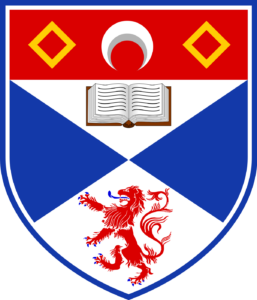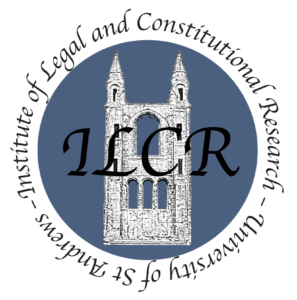MLitt in Legal and Constitutional Studies

Combining historical and contemporary approaches within one unique, cross-disciplinary, degree, the MLitt in Legal and Constitutional Studies introduces students to a dynamic and expanding field of research. This degree enables students to pursue an exciting programme of study, through a combination of research-led taught classes and directed individual study.
The core modules are taught by faculty from across the Schools of History, International Relations and beyond. They equip students with knowledge of different theoretical approaches to law, legal history and constitutionalism, using the past to interrogate and investigate current issues and controversies. The core modules also provide students with the practical skills and approaches to undertake comparative study of aspects of law, legal history and constitutionalism.
The specialist modules are designed to be flexible enough to enable students to choose their own areas of in-depth study and include individually tailored research training and guidance. Students will be taught through a range of group seminars, workshops, one-to-one discussion and supervised independent research projects. The University of St Andrews also offers additional language teaching that is open to students at all levels of ability, including courses in Arabic and Mandarin.
The degree caters for students from different academic backgrounds and with diverse career plans. It is designed to prepare students for work beyond the MLitt: doctoral research within the field; study for a Law degree; and employment in areas more broadly related to law, legal history, global constitutionalism and international relations.
The MLitt draws on the long established, internationally recognised, teaching and research strengths of the Schools of History and International Relations. Both Schools received top-rankings within the 2014 Research Excellence Framework and within national student surveys.
The research interests of faculty teaching on the MLitt range from late antiquity to the present, with expertise that encompasses innovative global and cosmopolitan approaches, alongside more traditional legal and jurisprudential methodologies. All teaching is undertaken by experts who are actively engaged in legal, constitutional and historical studies.
Course Overview
Students can construct an individually tailored degree with a primary focus in legal history; OR a primary focus in global/international law; OR they can pursue an integrated, interdisciplinary, degree.
The MLitt degree includes two semesters of full-time (or four semesters part-time) study of taught modules. In semester 1, students take the compulsory module “The Idea of Law” (30 credits) and either “Approaches to Legal History” or “Approaches to International law” (both 30 credits).
In Semester 2, students take the compulsory module “Comparative Studies in Legal and Constitutional Research” (30 credits), which builds directly on the Semester 1 modules. Students also pursue an individually tailored module of directed study: “Special Topic in Legal and Constitutional Studies 2” (30 Credits). It may be possible to substitute “Special Topic in Legal and Constitutional Studies 2” for an approved optional module.
All students who successfully complete the coursework to the required level will continue on to the Masters dissertation (60 credits), a 15.000 word piece of research completed under the guidance of an expert supervisor, leading finally to the award of the MLitt degree.
Semester 1
Compulsory Module: The Idea of Law
This core module offers a distinctive introductory overview to the ‘Idea of Law’, introducing students to fundamental concepts, debates and frameworks relevant to law, legal history and constitutional studies. Taught in a seminar format, the module offers students a practical and theoretical foundation relevant to the overall programme, including the development of analytical skills necessary for research at masters-level. In particular, training in jurisprudential and historical thinking provides a basis for individual investigation and group discussion of a variety of relevant themes and topics: for example, law and statehood, colonialism, empire and law; law and social science; traditions within nineteenth- and twentieth-century jurisprudential thought; law in society; law and global constitutionalism.
Optional Modules:
Approaches to Legal History (LC5021)
This module examines a range of approaches to legal history, exploring their assumptions, justifications, benefits, and limitations. It provides students with a grounding in particularly influential authors and works on the history of law, and also requires critical reflection on method. It will provide students with a detailed knowledge of certain fundamental texts and the debates that they generated, thereby helping them to develop the skills needed to understand and evaluate the arguments presented by legal historians since the nineteenth century. Taught in a seminar format, topics include a critical evaluation of the common law tradition of legal history (Pollock, Maitland and Milsom); law and society approaches (Marx, Maine, Thompson); dispute studies (including the influence of social anthropological frameworks); and an overview of the distinction between ‘internal’ and ‘external’ approaches to legal history.
Or:
Approaches to International Law (LC5022)
This MLitt module provides fundamental training for students specializing in issues relating to International Law. It examines the underlying philosophy of International Law, including its historical origins, but focuses primarily on the ideas underlying international law. The module will explore philosophical issues arising from the nature of international law, its sources, enforcement and related issues. Taught in a seminar format, topics include natural versus positive law; the problems of sources of international law and its enforcement; states, sovereignty and people; force, responsibility and rights; global commons; and critical perspectives on post colonial / Third World law and Global law.
Approaches to International Law (LC5022)
This MLitt module provides fundamental training for students specializing in issues relating to International Law. It examines the underlying philosophy of International Law, including its historical origins, but focuses primarily on the ideas underlying international law. The module will explore philosophical issues arising from the nature of international law, its sources, enforcement and related issues. Taught in a seminar format, topics include natural versus positive law; the problems of sources of international law and its enforcement; states, sovereignty and people; force, responsibility and rights; global commons; and critical perspectives on post colonial / Third World law and Global law.
Semester 2
Compulsory Modules:
Comparative Studies in Legal and Constitutional Research (LC5002)
This core module provides a forum for students to develop, present, and write on a particular area of legal and constitutional research, drawing on theoretical and methodological ideas from Semester 1 modules. Taught in a seminar format, it is specifically designed to provide practical and focused preparation for dissertation writing. Students will receive guidance on the preparation and presentation (oral and written) of a research subject, including Masters’ level argument-construction skills. They will then conduct research in their chosen field. Presentations to the whole class will provide feedback not just on the particular topic, but will act as a forum for an exploration of the possibilities of comparison and comparative methodologies within legal and constitutional research.
Special Topic in Legal and Constitutional Studies 2 (LC5026)
This module gives students the opportunity to undertake detailed research and tuition within a specialized field of their choice. It also provides for individual or very small group supervision.
It may be possible to substitute the “Special Topic in Legal and Constitutional Studies 2” module for an approved optional module. Depending on availability, these optional modules may include – but are not limited to – the following:
Either:
Comparative Studies in Legal History (LC5024)
Comparative Studies in Legal History provides a forum for students to develop, present, and write on a particular field or topic in legal history, drawing on methodological ideas from Semester 1 modules. Taught in a seminar format, it is specifically designed to provide practical and focused preparation for dissertation writing. Students will receive guidance on the preparation and presentation (oral and written) of a research subject, including Masters’ level argument-construction skills. They will then conduct research in their chosen field. Presentations to the whole class will provide feedback not just on the particular topic, but will act as a forum for an exploration of the possibilities of comparison and comparative methodologies within legal history.
Or:
Global Constitutionalism
This module provides fundamental training for students specializing in Constitutionalism. It examines a range of approaches to Global Constitutionalism, exploring their assumptions, justifications, benefits, and limitations. It draws on key thinkers in the history of legal and political thought and explores a range of issues relating to the emergence of a global constitutional order. Taught in a seminar format, topics include the history of constitutionalism (classical, medieval, early modern and modern); constituent power; the rule of law; the separation / balance of power; constitutionalism and international law; constitutionalism and international organizations; and constitutionalism and cosmopolitanism.
Scholarships
The Institute of Legal and Constitutional Research is offering a number of scholarships to students applying for the MLitt in Legal and Constitutional Studies (MLitt L&CS).
1. ILCR MLitt Legal and Constitutional Studies Scholarship
The ILCR MLitt scholarship competition is open to outstanding Home/EU and International Students who are applying for a place on the MLitt L&CS at the University of St Andrews, to commence September 2023. Awards will be made on the basis of academic merit. Students applying for the MLitt L&CS are also eligible to apply for School of History postgraduate studies scholarships.
An ILCR MLitt scholarship for 2023/24 will offer the cash equivalent of one year’s home fees. It cannot be held in conjunction with other awards offering full fees and maintenance.
How to apply for the MLitt scholarship
The ILCR MLitt Scholarship competition is administered by the School of History. Please go here and follow the instructions.
The application deadline for the School of History and the MLitt L&CS Scholarship competition is 14 April 2023.
Full details on applying for an MLitt scholarship via the School of History will be sent – along with log-in instructions for the University funding application system – once you have been offered a place to study here by the Admissions team.
2. MLitt Legal and Constitutional Studies ‘Equality and Diversity’ Scholarship (home fee), 2023 entry
The School of History and the Institute of Legal and Constitutional Research, with the generous support of the Tay Charitable Trust and alumni, would like to offer one scholarship to a 2023-entrant ‘MLitt Legal and Constitutional Studies’ student, with the aim of widening access to students from groups traditionally excluded or under-represented in UK academia.
In making decisions about the award of the scholarship, we will consider a variety of criteria, including, but not limited to the following:
- We may give preference to applicants who self-identify as members of excluded or under-represented minorities.
- We may give preference to applicants who are historically underrepresented in History and/or Legal Studies (students who are ethnic minorities in the UK, students with disabilities, students who are the first in their family to attend university).
- We may give preference to applicants from socio-economically disadvantaged backgrounds.
- We may give preference to applicants who can demonstrate an annual household income of less than £34,000.
The scholarship will be for a period of 1 year and will cover tuition fees at home rate.
How to apply for the MLitt ‘Equality and Diversity’ scholarship
Applications can be made via the University’s Fund catalogue.
Application is by supporting statement (no more than one A4 side), detailing how your MLitt application relates to the criteria listed above and / or giving other arguments in support of your application.
The deadline for applications is Monday May 15, 2023. Applicants will be notified with the outcome of the competition in early June.
Applicants for the scholarship must have received an offer to study on the MLitt Legal and Constitutional Studies before the scholarship application closing date.
Further information can be requested from Professor Caroline Humfress ([email protected]).
Note that students applying for the MLitt L&CS are eligible to apply for both the School of History postgraduate scholarships and the ILCR scholarships, although you may only hold one or the other.
How to apply for a place on the MLitt Legal and Constitutional Studies
To apply for 2023 entry to the MLitt in Legal and Constitutional Studies at the University of St Andrews see here.
For general details about student life and study at St Andrews see here.

